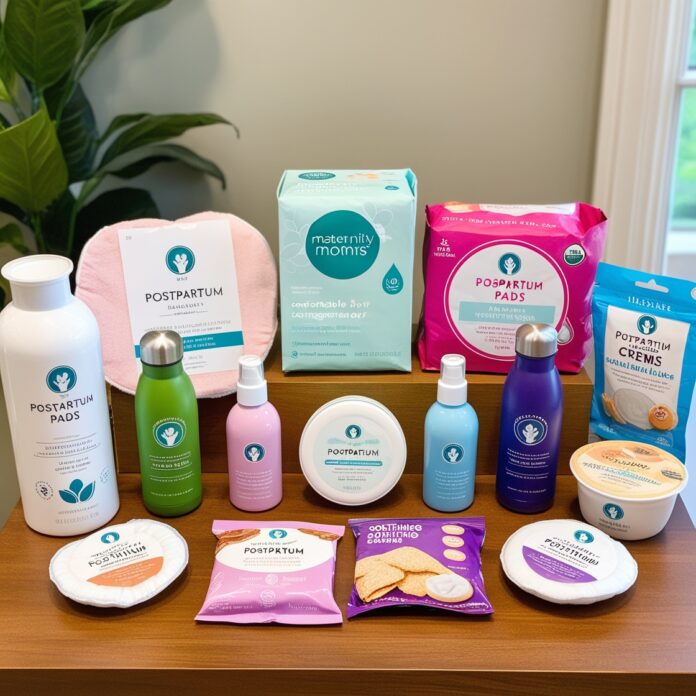The period after birth is so pivotal in the life of a new mother, who has to go through not only physical recovery but also emotional changes along with learning the tasks a newborn requires. Knowing what to expect can make the transition easier as you feel more self-assured about this journey. This guide discusses the most important areas of the postpartum period and offers some practical advice on how one can prepare for it much better.

1. Understanding Physical Recovery After Birth
Your body goes through dramatic changes in pregnancy and childbirth, while the postpartum is a time of resting and recuperation. Physical recovery certainly varies depending on the birth experience, but most new mothers share many challenges.

Common Physical Changes
You can expect to deal with many physical symptoms in the weeks after delivery as your body heals:
- Vaginal Soreness: Mild soreness with swelling for the first days following a vaginal delivery is expected. Sit baths and ice packs may be helpful to relieve discomfort.
- Recovery from Cesarean Section: Healing after a cesarean section takes much longer; one can expect incision care for several weeks and limited activity.
- Bleeding: Many women experience after-childbirth bleeding, Lochia, that may last up to six weeks. The amount will gradually lessen over time.
- Changes to the Breast: Milk production gives the breasts a fuller, tender state.
Putting Together a Postpartum Recovery Kit
You may want to put together a recovery kit with items that will help you recover. Some things to think about including:
- Maternity Pads and Comfortable Pants/ Clothing: Comfortable, loose-fitting clothes with high-absorbency pads are a staple for comfort.
- Nipple Cream and Nursing Pads: These should be ready and waiting so that you can begin nursing in comfort.
- Pain Relievers and Cold Compress/Ice Pack: speak with your care provider about safe pain-relieving options.
Having this ready in advance will only make your recovery less stressful, and you can spend the rest of your time bonding with the new baby.
2. Emotional Adjustments
Postpartum is not just a time for physical recovery, but also one when one goes through emotional adjustment. New mothers go through a potpourri of emotions, including joy, exhaustion, and anxiety; thus, preparing for the mental aspects also of postpartum recovery becomes an absolute necessity.
Understanding Baby Blues vs. Postpartum Depression
Many women have what is called “baby blues,” and these are the temporary mood changes brought about by hormonal fluctuations and stresses of new parenthood. Symptoms may include:
- Sad feelings or irritability
- Mood swings and anxiety
- Sleep problems
Baby blues are not uncommon but often resolve within two weeks. Ongoing sadness might be postpartum depression. Talk with a healthcare provider if you always feel sad, you’re no longer interested in things that once pleased you, or you’re having trouble bonding with your baby.
Building a Support System
A good support system can help emotionally recover from the stressors. Also, reach out to your family, friends, and support groups. Many new mothers find talking with others like themselves very reassuring.
Allow your partner, family, and friends to take some burden off your hands by helping with household chores and baby care, which will give you time for recovery and attachment with your newborn.
3. Care for Your Mental Health and Emotional Wellbeing
Caring for a newborn is rewarding and exhausting. Giving time to your mental health can make all the difference in how well you cope with looking after a new baby.

Practical Self-Care
The practice of self-care is not about complicated regimes but rather simple, straightforward activities that keep you grounded. To help you get started, consider these exercises:
- Mindfulness or Meditation: A few minutes of mindfulness each day may help to reduce stress and lift your mood.
- Setting Boundaries: You do not have to entertain visitors constantly, nor do you have to respond to every request straight away.
- Sleep When You Can: Sleep is essential. When your baby sleeps, so should you-even if it’s only a catnap.
Professional Support
Sometimes, professional help is necessary. Many therapists specialize in postpartum mental health and can counsel when feeling overwhelmed. Never be afraid to reach out to them at any time if you are feeling overwhelmed.
4. Challenges of Feeding and Newborn Care
Feeding can be overwhelming regardless of whether you plan to breastfeed, formula-feed, or do a bit of both. Knowing what to expect and where to find support can ease this part of your postpartum experience.
Breastfeeding Tips
Breastfeeding can be daunting-especially those early days. A lot of moms find the following helpful:
- Lactation Support: Lactation consultants can help you with common issues like difficult latches and low milk supply.
- Hydration and Nutrition: These are the major features in the production of milk, so one is always hydrated and on balanced diet.
Formula Feeding Considerations
In case of using formula, have all that you may need around you, including bottles, sterilizers, and a formula dispenser. This also complements learning formula safety to ascertain that your baby will be well-fed and healthy.
5. Adjusting to New Routines
Life with a newborn means new routines, and it will take some time to settle into them. Go easy on yourself and try not to have too high of expectations as you make this transition.
Setting Realistic Expectations
It is important not to put too much pressure on yourself during the postpartum period to be “perfect.” Limit your activities to the basic tasks of feeding, diapering, and sleeping, and only include additional activities that you can manage.
Rest and Nutrition
Healthy nutrition and rest can make a world of difference in how you feel. You may want to prepare meals in advance prior to the birth of your baby or arrange for meal support from family and friends during those early weeks. Keep in mind that caring for the baby includes caring for yourself.
6. Bonding with Your Baby and Building Family Connections
The postpartum period is a unique time to bond with your baby and establish your unit. Patterns of interaction, such as skin-to-skin contact, gentle rocking, and talking with your baby, promote secure attachments and an environment of empathy.
Skin-to-Skin Contact
Skin-to-skin contact promotes bonding, but it also helps to regulate your baby’s heartbeat and temperature. Snuggle your baby close at feeding and quiet times to enhance bonding.
Involving Your Partner and Family Members
Spend time with the baby together with your partner or family members. You can share in creating special moments that each will always treasure. When others help to care for the baby, you have the opportunity to rest, which may make the demands put on you a little more manageable.
7. Looking Ahead: The Final Postpartum Visits and Self-Care
It is important to attend postpartum checkups to follow up on your physical recovery and discuss any concerns you have with your healthcare provider. In these visits, one will be able to go through the following:
- Healing Progress: Your provider will check on your physical healing process and advise when resuming your usual activities.
- Mental Health: Discuss how you cope with your emotions and seek resources if necessary.
It will also guarantee you follow-up sessions for recovery and help apprehend emerging concerns.
Thus, preparing for this postpartum period could be a way to prepare the new mom for the physical, emotional, and mental challenges that come with early motherhood. You are going to be in a better position to actually enjoy this journey and make it rewarding for you and your baby when you have the proper mindset, support, and resources.



